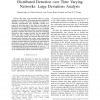Free Online Productivity Tools
i2Speak
i2Symbol
i2OCR
iTex2Img
iWeb2Print
iWeb2Shot
i2Type
iPdf2Split
iPdf2Merge
i2Bopomofo
i2Arabic
i2Style
i2Image
i2PDF
iLatex2Rtf
Sci2ools
118
click to vote
CORR
2010
Springer
2010
Springer
Distributed Detection over Time Varying Networks: Large Deviations Analysis
—We apply large deviations theory to study asymptotic performance of running consensus distributed detection in sensor networks. Running consensus is a stochastic approximation type algorithm, recently proposed. At each time step k, the state at each sensor is updated by a local averaging of the sensor’s own state and the states of its neighbors (consensus) and by accounting for the new observations (innovation). We assume Gaussian, spatially correlated observations. We allow the underlying network be time varying, provided that the graph that collects the union of links that are online at least once over a finite time window is connected. This paper shows through large deviations that, under stated assumptions on the network connectivity and sensors’ observations, the running consensus detection asymptotically approaches in performance the optimal centralized detection. That is, the Bayes probability of detection error (with the running consensus detector) decays exponentially ...
Related Content
| Added | 24 Jan 2011 |
| Updated | 24 Jan 2011 |
| Type | Journal |
| Year | 2010 |
| Where | CORR |
| Authors | Dragana Bajovic, Dusan Jakovetic, João Xavier, Bruno Sinopoli, José M. F. Moura |
Comments (0)

